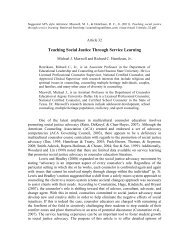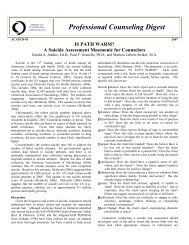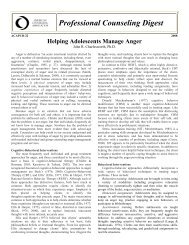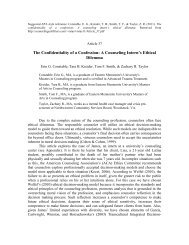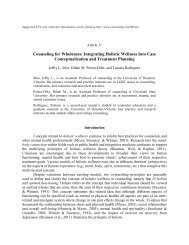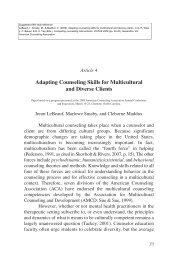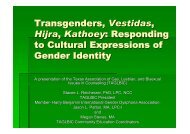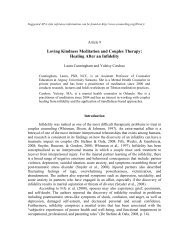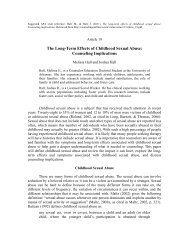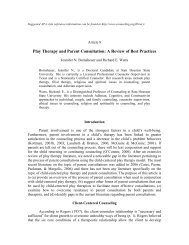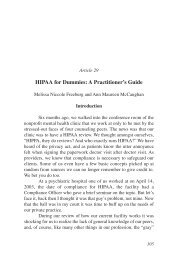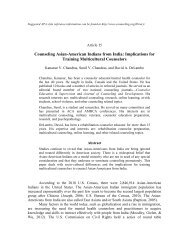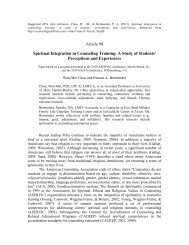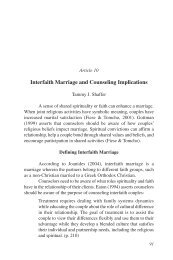Integrative Mental Health and Counseling - Counselingoutfitters.com
Integrative Mental Health and Counseling - Counselingoutfitters.com
Integrative Mental Health and Counseling - Counselingoutfitters.com
You also want an ePaper? Increase the reach of your titles
YUMPU automatically turns print PDFs into web optimized ePapers that Google loves.
Ideas <strong>and</strong> Research You Can Use: VISTAS 2011levels <strong>and</strong> to serve many systems (Gale & Austin, 2003). <strong>Counseling</strong> aims to help clientsaddress their wounds <strong>and</strong> psychopathology with the hope of moving into optimal mentalwellness where clients may live more self-actualized lives (Sperry, 2005). At the sametime, but separately <strong>and</strong> under a different operational design, integrative therapies aim tohelp clients heal from the many wounds <strong>and</strong> traumas that occur in a human lifetime.However, neither counseling nor CAM has interacted intentionally with the other toaddress what each brings to the larger conversation on healing <strong>and</strong> wellness. In order tobetter underst<strong>and</strong> the impact of CAM it is important to review existing research <strong>and</strong>consider clinical applications.Research ReviewTo date, there are many studies being conducted using r<strong>and</strong>omized, controlled,double-blind designs which attempt to parse out true effects of CAM treatments fromplacebo effects to demonstrate the empirical validity of <strong>com</strong>plementary <strong>and</strong> alternativemedicine (Lake, 2006; NCCAM, 2010; Shah et al., 1999). Most studies have beenconducted in the fields of medicine <strong>and</strong> nursing but, as demonstrated, there areimplications for mental health <strong>and</strong> counseling. In general, the research has focused onchronic pain <strong>and</strong> other physical disorders but some studies have examined psychologicaldisorders such as depression <strong>and</strong> anxiety as mostly secondary out<strong>com</strong>es (NCCAM, 2010;Krisanaprakornkit, Krisanaprakornkit, Piyavhatkul, & Laopaiboon, 2006). This researchis broad, covering the NCCAM categories of nutrition, energy, <strong>and</strong> herbs, to name a few.There are a few studies directly linking the helping professions <strong>and</strong> CAM butcurrently the number is small <strong>and</strong> none have examined the relationship betweencounseling <strong>and</strong> CAM specifically. Caldwell, Winek, <strong>and</strong> Becvar (2006) <strong>and</strong> Becvar,Caldwell, <strong>and</strong> Winek (2006) explored the relationship of CAM to marriage <strong>and</strong> familytherapists (MFTs) both through a national survey <strong>and</strong> through qualitative interviews <strong>and</strong>found that MFTs are indeed encountering clients using CAM. However, they stated thatthe MFTs lacked education about the various therapies <strong>and</strong> determined that there was aneed for further education for both practitioners <strong>and</strong> clients so that these therapies can beproperly assessed for safety <strong>and</strong> efficacy.Some studies have looked at the use of acupuncture as an adjunctive treatment forsubstance abuse (Brumbaugh, 1993). There are a variety of reasons why substance abusecounselors have explored CAM but one important reason is treatment resistance with theclients. This area, if further explored, could add more weight to the continued researchlooking at the connection between CAM <strong>and</strong> counseling. Thus far, the counseling fieldhas not yet explored this issue in a generalized sense. One study by Collinge, Wentworth,<strong>and</strong> Sabo (2005) examined the <strong>com</strong>bination of psychotherapy <strong>and</strong> energy therapies onsuch disorders as PTSD <strong>and</strong> anxiety. They used a small mixed methods design which hadsome flaws, but they found that both types of treatment were favorable for the clients insearch of healing.Many individuals seek out CAM without necessarily consulting the research <strong>and</strong>evidence evaluation (Berman & Straus, 2004). This discrepancy will be discussed as ameans to guide clients toward best CAM practices to supplement their counseling if theywish. Attempting to do empirical, quantitative research on energy therapies is achallenge, mainly because there tend to be too many confounds <strong>and</strong> some past research4



